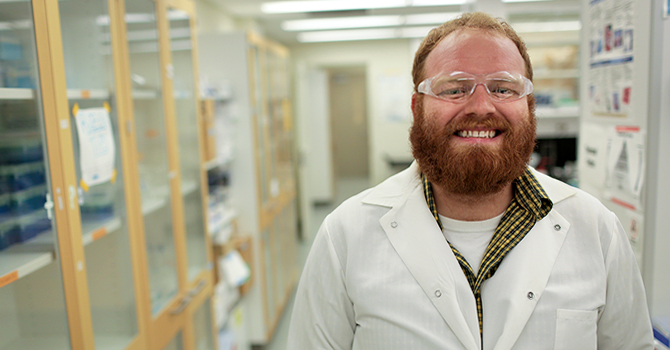Inspired by Mother and Supported by Hometown to Answer Breast Cancer Questions

Evan Hill
PhD Student in Environmental Health Sciences
I became interested in public health because of the close relationships I formed in my hometown of Arlington, Ohio. It's a small town, and cancer is a disease that hits everyone in some way. In a small town, that can seem magnified. When someone in the community is diagnosed with cancer, it doesn't take long for the news to spread and for people to reach out to help. I really experienced this when my mother was diagnosed with triple-negative breast cancer.
My mom is a cancer survivor and is still with us—and she is a big reason I became interested in public health and in cancer research in general. Having that personal connection to my research can be motivating on some days. I'm inspired as well by the support that my mom and I received from our community.
Thinking about all the things we don't know and then beginning to explore answers in the lab really appeals to me. There's so much creative work, creative energy, that goes into scientific work. My favorite thing about academic research is just asking questions. In meetings with professors, I like to brainstorm different questions. Then we figure out how to answer them in our lab.
I am researching the effects of obesity and adipose tissue on normal breast stem cells. According to the American Cancer Society, 15–20 percent of breast cancers are associated with obesity. So obesity is a risk factors we know a lot about. But until about 20 years ago, we didn't know what adipose tissue was doing other than storing fat.
Knowing and understanding how obesity changes adipose tissue is important in understanding how obesity relates to certain diseases.
We've discovered in recent years that adipose tissue does more than just store energy. It secretes into the bloodstream proteins (adiponectin and leptin) that play a main role in appetite regulation in the brain. Adipose tissue also plays a role in breast development and secretes numerous other proteins that act on tissue locally or throughout the bloodstream. Knowing and understanding how obesity changes adipose tissue is important in understanding how obesity relates to certain diseases.
In premenopausal breast cancers, for example, obesity is actually thought to be protective. Much of our data suggest obesity protects specifically against hormone-receptor positive breast cancers. But with triple negative breast cancers, obesity is associated with an increased risk and worse prognoses. Triple negative breast cancers are the most aggressive type where we don't yet have reliable targeted therapies.
Communicating science is difficult. Obesity being protective against cancer in certain cases is an example of the nuance we have to be ready to explain to the public. I maintain a Facebook account for the sole purpose of seeing what people are saying about cancer research and what kinds of misconceptions are out there. This has helped me think through how we might formulate responses to some of those misconceptions and help people understand the value of work and the clarity of some of our results, even if they have to be qualified for certain populations or certain cancers. It's a good mental exercise to understand public perceptions of science and to think through how we talk about science ourselves.
It's a good mental exercise to understand public perceptions of science.
I work in Dr. Justin Colacino's lab. Whenever we have questions about communication—maybe there's something in our research someone wants to ask us about—we discuss with him some strategies for communicating about this topic. He talks us through it to help us gain confidence and anticipate confusing parts of the conversation. Dr. Colacino is really good at setting aside time for us to talk about these important things. In general, he's great at setting aside time for students.
Specific to cancer research, in some instances, is effective communication to the public about product safety. Social media is a trusted news source for many people, and a lot of misinformation is broadcast widely. Effectively communicating our research through these platforms is an important part of combating misinformation. Dr. Colacino, for example, has been an active voice for effective communication in the case about the class-action lawsuit against La Croix because of certain chemicals found in their products.
My decision to pursue a PhD at Michigan had much to do with the resources we have at the school. I'm at a world-class university doing what I love. But without the funding I've received through the Environmental Toxicology and Epidemiology Program (ETEP), I would have pursued a job after completing my master's degree—I would not have been able to consider a doctoral degree. My family has limited abilities to support my studies financially, so this financial support from the school has made all the difference for me.
ETEP is a training grant funded by the National Institutes of Environmental Health Sciences. The program offers unique seminars and recommends classes that fulfill the training grant—advanced toxicology and advanced epidemiology. And you're supported as a graduate student: tuition, stipend, and so on. As a toxicologist, the Environmental Health Sciences department thought my skill-set fit well with the ETEP grant. We attend some of the seminars together as a cohort. We're in class together. We hold a symposium every year—an environmental health sciences symposium. It's a fantastic circle of academic and professional support.
My master of science degree at Michigan Public Health was exploratory. Now I'm certain public health is aligned with so many of my passions and talents. And the open, creative way research is approached at the school is perfect for me.
